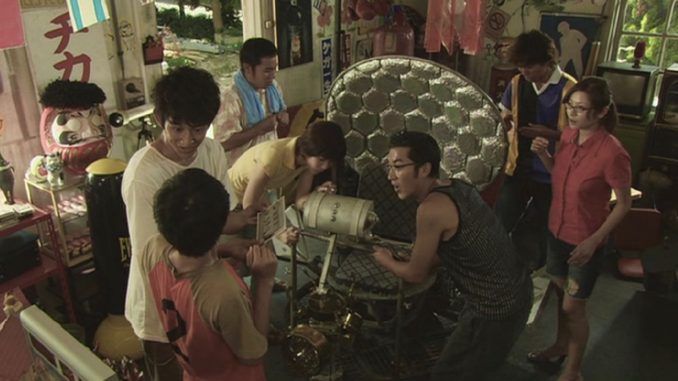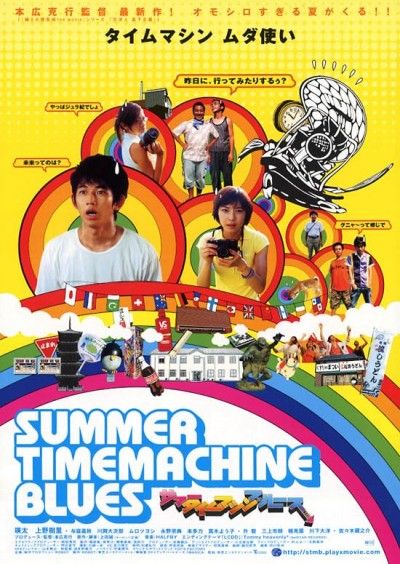
Rating: B
Dir: Katsuyuki Motohiro
Star: Eita Nagayama, Yoshiaki Yoza, Daijirô Kawaoka, Munenori Nagano
Giving a time-machine to sci-fi nerds… Yeah, that’s probably going to cause more problems that it’ll solve. The results of this film would seem to support that hypothesis. It begins on a hot summer day, when the five members of a college SF society are goofing around playing baseball, while a colleague from the photography club shoots them. Thereafter, bits of mild weirdness occur, such as one guy’s beloved Vidal Sassoon shampoo vanishing in the bath-house. Then they spill soda on the remote control for the clubhouse AC, leaving them sweatier than ever. And a time machine shows up, piloted by a member of the club from twenty-five years into the future. What could possibly go wrong?
Naturally, the top priority is to go back into the past and save the remote control from its moist, sticky fate. However, the mission doesn’t quite remain as focused as it should, and before long, they’re desperately trying to avoid breaking their own present, or ending up with multiple copies of people in the same time-line. To give just one example: they take the shampoo, to prevent it from being stolen. Guess how that works out? There’s some glorious inventiveness here, such as the explanation for the local legend of a river sprite, whose century-old statue ends up bearing a peculiar resemblance to a club member. Or the dog which ends up saving the day. Or the person who bypasses the need for time-travel by hiding in a locker.
 Any real sci-fi nerds will enjoy the references, subtle or otherwise, to other time-travel media. The machine itself is clearly inspired by the sixties H.G. Wells adaptation, The Time Machine, while Back to the Future and Star Trek also receive nods. Amusingly, the society are oblivious to most of these, and it’s clear this is far more a social club than anything: “I don’t even know what ‘sci-fi’ means!” says one member proudly. Make no mistake, it does teeter on the edge of incomprehension, and there were points in the middle that I felt I needed some kind of chart or spread-sheet, to keep track who was doing what, and when. [Writer Makota Ueda would subsequently revisit the topic of time, more than once, with a bit more rigour]
Any real sci-fi nerds will enjoy the references, subtle or otherwise, to other time-travel media. The machine itself is clearly inspired by the sixties H.G. Wells adaptation, The Time Machine, while Back to the Future and Star Trek also receive nods. Amusingly, the society are oblivious to most of these, and it’s clear this is far more a social club than anything: “I don’t even know what ‘sci-fi’ means!” says one member proudly. Make no mistake, it does teeter on the edge of incomprehension, and there were points in the middle that I felt I needed some kind of chart or spread-sheet, to keep track who was doing what, and when. [Writer Makota Ueda would subsequently revisit the topic of time, more than once, with a bit more rigour]
But it’s a film which keeps delighting and surprising e.g. unexpected Gilbert O’Sullivan, who apparently was very popular in Japan, and you should reach the end with a goofy, warm-natured grin on your face. There’s no antagonist as such – except, perhaps, time and its paradoxes – just an ensemble cast, working together to fix a problem, while frequently mocking each other in the way only good friends can. That holds the film together, when it threatens to collapse under its own weight, and keeps it a rewarding experience. The sheer lightness in the way the topic is handled, in contrast to Terminator-like apocalyptic prophecy, makes it a refreshing sorbet in the time-travel genre.
